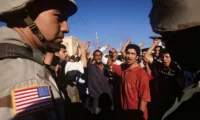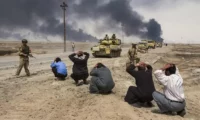España en Irak, gran manipulación
Siento vergüenza ajena cuando se acusa al Gobierno de España, entonces presidido por Aznar, de intervenir en la «ilegal guerra de Irak» y «contra la ONU» Recientemente se ha vuelto a escuchar en el Congreso de los Diputados siguiendo la habitual trampa del Gobierno de hacer oposición a la oposición. ¡Y retrocediendo veinte años! Señalaré hechos que desmontan esa manipulación tan reiterada.
La II guerra de Irak de 2003 era una reedición de la I guerra del Golfo de 1990-1991. Se produjo porque Sadam Husein no cumplió las condiciones impuestas por la coalición vencedora. El paraguas de la ONU estaba vigente durante el periodo 1990-2003.… Seguir leyendo »

















